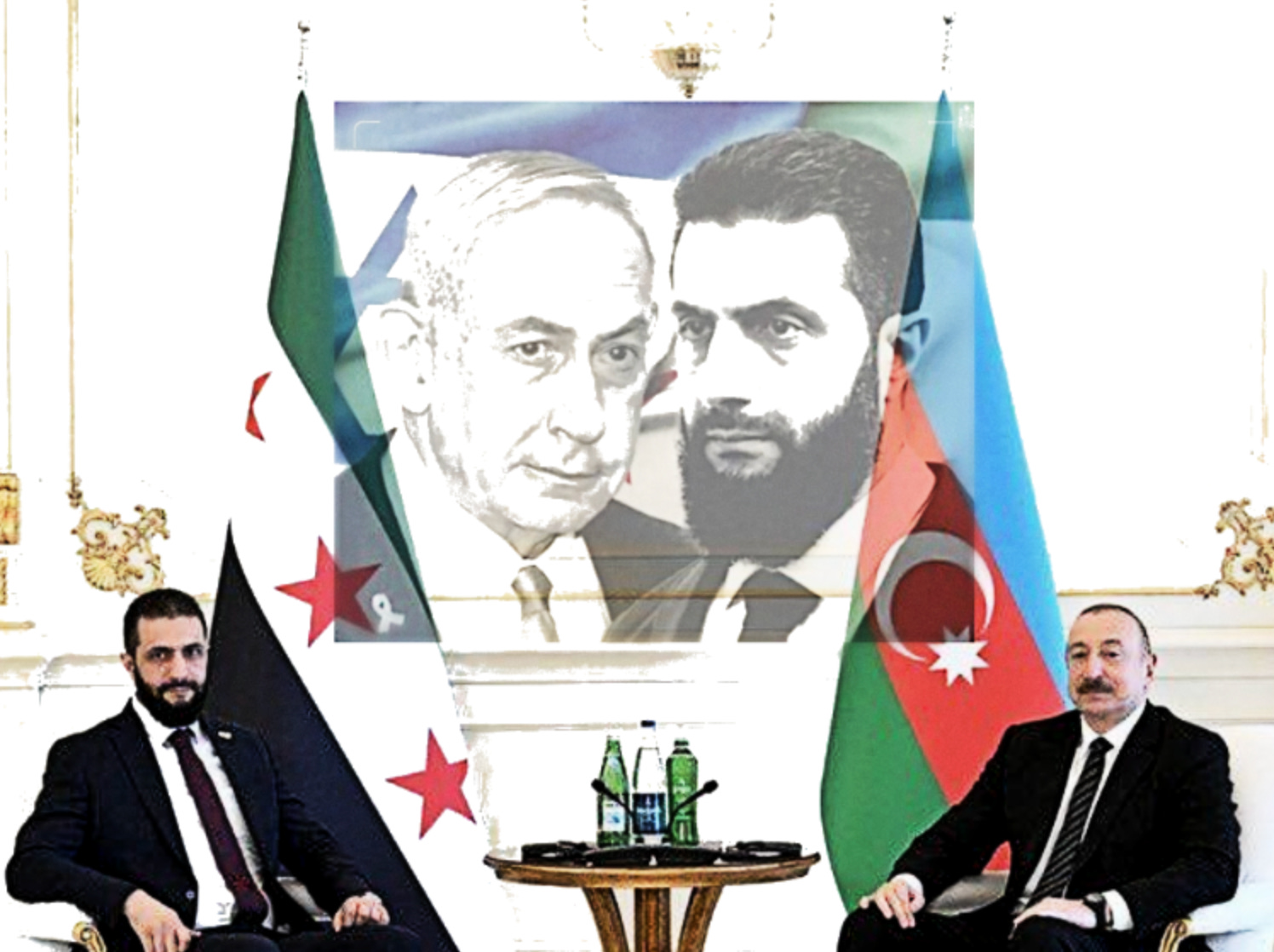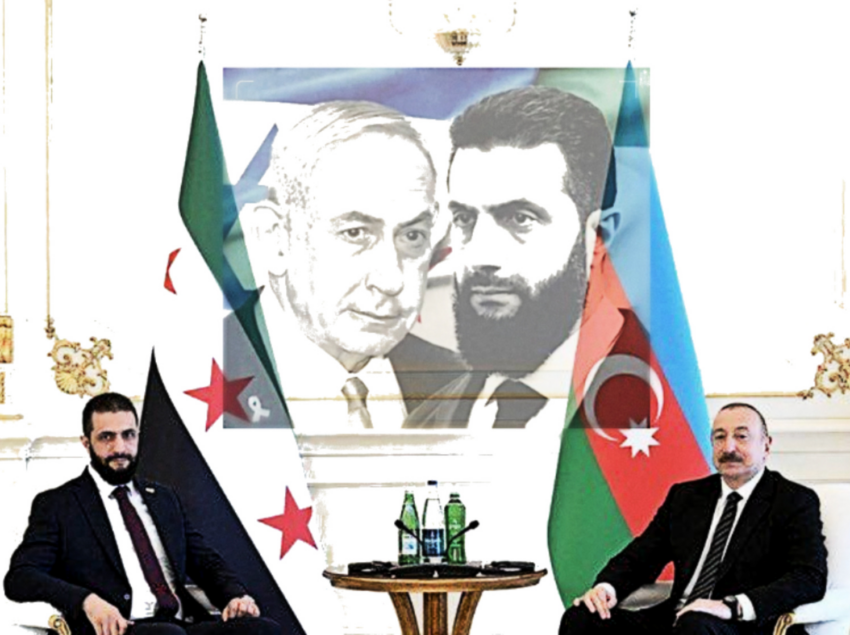
By Vanessa Beeley
There were no casualties in Israel’s bombing of Damascus and Jolani had advance warning to leave the capitol.
[…]
Syria is Now the Crossroads for Regional Interests
Part of the alleged security deal between Jolani and Israel includes a Syria, Turkey, and Israel deal to bring water from the Euphrates through Syria to Israel. The problem with this project lies in the competing spheres of influence. Turkey is a NATO member state, and a long-time intelligence, arms, and economic ally of Israel. Baku oil is being supplied to Israel through Turkey, despite the ongoing Zionist genocide in Gaza and expansion of land grab in the West Bank.
Syria is a major area of competition for Israel and Turkey. The Greater Israel project clashes with the neo-Ottoman empire. President Erdogan’s aspirations are to have sole guardianship of Syria post-Assad. Jolani has changed the rules of the game, as he did when he left ISIS to establish Al Qaeda in Syria.
[…]
The US views regional interests through the lens of Israel. Erdogan does not want Syria to normalise with Israel, even though he would not say so publicly. Jolani is clearly edging towards a first phase of normalisation, which is a condition set by Trump for the lifting of sanctions and potentially other ‘under the table’ deals. For Erdogan, normalisation means the Zionisation of Syria and the reduction of his role in the country. It would also mean increased Gulf State influence, which would be a blow to Erdogan, positioning himself as the leader of the Muslim world.
[…]
Local sources in Damascus report that Mossad operatives are regular visitors to the Four Seasons Hotel, along with American, British, and French Intelligence agents. Previously, Turkish intelligence dominated the post-Assad scene in Damascus. However, squeezing Erdogan out of the Syrian picture beyond containment in the north could lead to unintended consequences for Jolani and the Zionist bloc.
[…]
Will the US Supply Weapons to Jolani, and Are the Sanctions Really over?
With the apparent lifting of the terrorist designation for HTS, there is a risk that the US will take advantage of the legitimisation of the HTS regime to supply weapons to help Jolani reinforce Israel’s security in the region.
[…]
According to a reliable source in Syria, there are misconceptions over the lifting of sanctions on Syria. The following points were made:
- Trump lifted sanctions on 519 individuals and entities. It was a PR stunt. Some sanctions were lifted from former President Bashar Al Assad and some former government officials.
- The most important and damaging sanctions related to economic support and reconstruction, such as the Caesar Act and designating Syria as a ‘state sponsor of terrorism’, were not removed.
- These laws require a congressional resolution, and Trump alone does not have the authority to repeal them. Trump could have granted a temporary waiver for six months or a year pending congressional approval, but he did not do this.
- The decision issued by US Secretary of State Marco Rubio to rescind the designation of ‘Jabhat al-Nusra/Hay’at Tahrir al-Sham’ as a Foreign Terrorist Organization (FTO) under 8 U.S.C. 1189(a)(6)(A) does not, in any way, remove the entity from the sanctions lists under 50 U.S.C. 1702. So, this is also a PR exercise that largely benefits the US and Israel, not Jolani, as the sanctions threat is still in place.
- Effectively, HTS is no longer a ‘Foreign Terrorist Organisation’, but it is still a ‘Specially Designated Global Terrorist’. This means members of HTS can visit New York and Paris, but nobody can have financial dealings with them or send them weapons directly, at least not before the Treasury Department issues a decision to lift this status.
[…]
The Importance of Homs, Syria, on the Border with Lebanon

Homs’ strategic importance for all players in Syria is its position in the centre of the country and its role as a major trade and transportation hub, combined with its wealth of hydrocarbon resources. Furthermore, the Governorate of Homs extends from the Iraqi border, through the central Syrian desert, including Palmyra, to the Lebanese border.
The recent focus of Jolani’s militia has been on the ethnic cleansing in the Homs region of all ethnic minorities, the theft of homes, and the settlement of Takfiri elements in the area to alter the demographic entirely. This should be compared to the ongoing brutal Takfiri settlement project in the Syrian coastal region.
The purpose of securing these regions, in particular, is to take full control of the Syrian territory adjacent to the northern and eastern borders with Lebanon. Homs constitutes a key focal point for military concentrations and the launching of missile attacks towards Lebanon. Additionally, it opens the route for ISIS to enter Lebanon from its strongholds in eastern Syria and the central Syrian desert.
Under the Syria-Israel security agreement, Homs would be central to the prevention of Iraqi Resistance forces reaching Lebanon to support Hezbollah.
The Zionisation of Syria — Has the Normalisation Project Failed or Remodelled?

Al Qaeda chief, Jolani, meets President of Azerbaijan, Ilham Aliyev
It remains to be seen how realistic is a public normalisation deal between Syria and Israel. There are hardline factions within HTS that will reject it. This will exacerbate the divisions already forming under Jolani’s command which have been discussed in previous articles. Ordinary Syrians, who grew up with the history of conflict between Syria and Israel, would also reject such a step.
[…]
On 13 July, Israeli media made the claim that Jolani met with Netanyahu’s special envoy in Baku, Azerbaijan. Central to the discussions between Jolani and Azerbaijan’s President Ilham Aliyev were solutions for Syria’s ongoing energy crisis, with the majority of oil reserves still occupied by the US and the Kurdish factions in the northeast. Azerbaijan proposed the export of natural gas to Syria via Turkey, which again brings Turkey into the picture, despite the challenges presented by competition with Israel.
However, it is certain, despite denials from various parties, that the main discussions were concerning the Syria-Israel security agreement. It is no coincidence that immediately after Jolani returned from Baku, tensions flared between Druze factions in southern Syria and the Bedouin, Syrian tribal factions linked to HTS and ISIS. This led to fierce and bloody clashes for 48 hours, which are still ongoing with HTS militia trying to gain control of the region and to bring the Druze factions to heel. Some factions within the Druze accepted a ceasefire, while others have continued fighting.
Israel will exploit the confrontation to fulfil the Zionist agenda to gain full access to and control over the Sweida province in southeast Syria, facilitating the David’s Corridor creation along the eastern border with Iraq and Jordan. To this end, a joint statement has been issued by PM Netanyahu and ‘Defence’ Minister Israel Katz pledging IOF military support for the Druze factions. This is a rapidly developing situation, one that I will cover in more detail in a future article.
HTS never had control of southern Syria. Formerly, it was Ahmed Al Awda and the pro-Russian forces of the Eighth Brigade that had maintained control, and were the first to enter Damascus on 8 December 2024. The UAE had attempted to mediate agreements between HTS and Al Awda, but with limited success.
[…]
Via https://beeley.substack.com/p/will-greater-syria-and-greater-israel
Click this link for the original source of this article.
Author: stuartbramhall
This content is courtesy of, and owned and copyrighted by, https://stuartbramhall.wordpress.com and its author. This content is made available by use of the public RSS feed offered by the host site and is used for educational purposes only. If you are the author or represent the host site and would like this content removed now and in the future, please contact USSANews.com using the email address in the Contact page found in the website menu.








